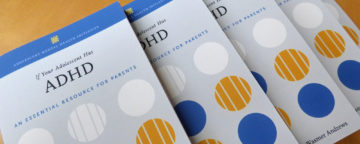"Treating and Preventing Adolescent Mental Health Disorders" is now available to researchers, medical practitioners, and the public as a free e-book on Oxford's website.


"Treating and Preventing Adolescent Mental Health Disorders" is now available to researchers, medical practitioners, and the public as a free e-book on Oxford's website.

Only a subset of teens who engage in excessive levels of impulsive behavior, such as acting without thinking, later struggle with addictions or other problem behaviors, a study has found.

'If Your Adolescent Has ADHD,' a supportive guide for parents that uses evidence-based approaches to treatment, is the latest book in a series developed under APPC's guidance.

For media reporting on the deaths of Kate Spade and Anthony Bourdain, these recommendations for reporting on suicide were developed by mental health, journalism and suicide prevention authorities, including APPC.

Nearly two-thirds of the newspaper stories linking the holidays and suicide over the 2016-17 holiday season supported a false connection between the two, according to an analysis of media coverage.

Teenagers with weaknesses in certain processes that are part of executive functioning are at a greater risk of hazardous driving, a literature review from researchers at APPC and CHOP has found.

In a new article based on a journal review, Dan Romer wrote about the problematic stereotype of the "wild teenage brain." He said much of what's mistaken for risky behavior is part of a normal exploratory drive.